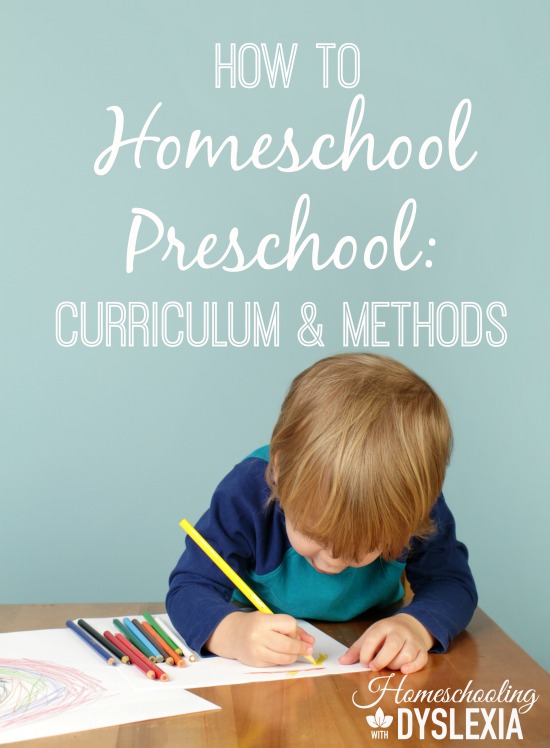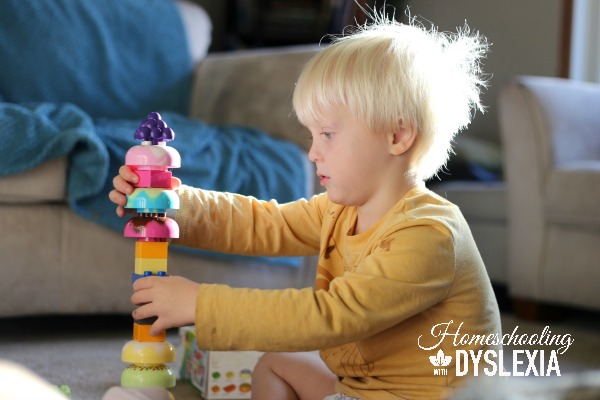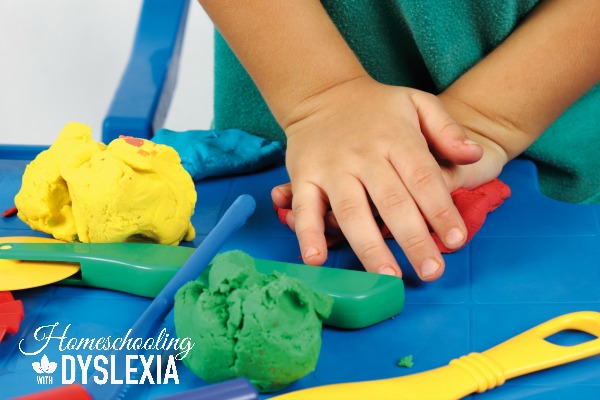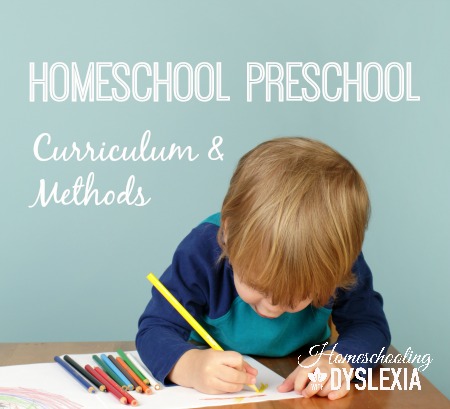Should your child go to preschool? The fact is, there is no evidence that healthy children from healthy homes benefit from attending preschool at all. Consider homeschool preschool instead.

Why talk about choosing to homeschool your preschoolers you might ask?
Preschoolers Thrive at Home
Many parents these days, homeschoolers included, are putting their children in preschool thinking that they are giving their kids an academic or social head start.
The fact is, there is no evidence that healthy children from healthy homes benefit from attending preschool at all. In fact, the research shows that there are no long-lasting benefits to preschool even for those from disadvantaged backgrounds.
Studies have actually shown more advanced developmental skills and greater empathy in children who stay home with mom, while increased aggression and sadness occur in those who spend the day away from their mothers.
Learning Through Play
Preschool aged kids learn primarily through play. Finding and collecting rocks on a nature walk help kids learn things like “big, bigger and biggest” and might inspire them to flip through a book on rocks if given the opportunity.

There are, however, things that parents can do enhance their kids’ preschool years.
Remember that preschool is less about learning facts and more about learning to love learning – something that comes naturally to young kids.
What should my preschooler be doing?
Scientists have gathered information on skills, also known as milestones, that kids achieve at various ages. Though these are the major skills to look out for, be aware that every child develops differently. My 8 kids have all developed these skills at different ages with one child consistently about 18 months behind schedule. He keeps progressing though so we are all happy. Thank God for homeschooling though!
Age 3
Social Development
Parallel play, enjoys being by others, takes turns, knows if he is a boy or girl, enjoys brief group activities requiring no skill, likes to “help” in small ways–responds to verbal guidance.
Intellectual Development
Says short sentences, great growth in communication, tells simple stories, uses words as tools of thought, wants to understand environment, answers questions, imaginative, may recite a few nursery rhymes.
Physical Development
Skips on one foot, draws “Man”, cuts with scissors (not well), can wash and dry face, dress self except ties, standing broad jump, throws ball overhand, high motor drive.
Emotional Development
Seems sure of himself, out-of bounds behavior, often negative, may be defiant, seems to be testing himself out, needs controlled freedom.
Age 4
Social Development
Cooperative play, enjoys other children’s company, highly social, may play loosely organized group games – tag, duck-duck-goose, talkative, versatile.
Intellectual Development
Uses complete sentences, 1540 words, asks endless questions, learning to generalize, highly imaginative, dramatic, can draw recognizable simple objects.
Physical Development
Hops and skips, dresses without help, good balance and smoother muscle action, skates, rides wagon and scooter, prints simple letters, handedness established, ties shoes, girls small muscle development about 1 year ahead of boys.
Emotional Development
Self-assured, stable, well-adjusted, home-centered, likes to associate with mother, capable, of some self-criticism, enjoys responsibility. Likes to follow the rules.
Age 5
Social Development
Highly cooperative play, has special “friends”, highly organized, enjoys simple table games requiring turns and observing rules, “school”, feels pride clothes and accomplishments, eager to carry out some responsibility.
Intellectual Development
Can tell long tales, carries out directions well, reads own name, counts to 10, asks meaning of words, knows colors, beginning to know difference between fact and fiction-lying, interested in environment, city, stores, etc.
Physical Development
Stands on one foot for 10 seconds or longer,h ops; may be able to skip, can do a somersault, uses a fork and spoon and sometimes a table knife, can use the toilet on her own, swings and climbs
Emotional Development
Wants to please friends, wants to be like friends, more likely to agree with rules, likes to sing, dance, and act, shows concern and sympathy for others, is aware of gender, can tell what’s real and what’s make-believe, shows more independence, is sometimes demanding and sometimes very cooperative.
For more detailed lists of developmental milestones, see this article from Understood.org.
Simple Ways to Homeschool Preschool at Home

Keeping your child home during the preschool years – homeschooling your preschoolers – should be simple and only take a little extra effort at being intentional with your time.
The following are some of the every day things you as a parent can do to nurture your preschooler during this time:
• Lots and lots of reading aloud. Encourage your kids’ love for books by taking time to read each day.
• Encourage your child to help with simple chores like folding dish clothes, putting away silverware, sweeping with a small broom and putting away their toys.
• Playing with siblings is a fantastic way to teach and encourage appropriate behavior while playing. Help them to learn the value of sharing and friendship.
• Help develop good language skills by speaking in complete sentences and using “grown up” words. Talk about everything – what you’re doing, seeing, cooking and reading. Fill their minds with lots of interesting conversations.
• As your preschoolers become more, how shall we say…assertive (ahem), try allowing them to make simple choices (for example, deciding what to wear, when to play, and what to eat for snack).
Curriculum Suggestions for the Preschool Years
One of the most practical guides to teaching preschool and kindergarten is Ruth Beechick’s The 3 Rs. These 3 small books contain tons of practical ways to teach using everyday experiences and materials.
Character Study
One of the best ways to inspire noble character in your kids is to find quality books to read aloud together. Sure we can sit down with them and tell them to be brave or kind but it is so much more relevant when they actually get to know a character in a story showing bravery or kindness.
Books list for character building books:
Other read aloud resources that we love:
The Read Aloud Revival at Amongst Lovely Things
Math
Think hands on math for any math resources you are considering. While you may find a preschooler here and there who likes to sit down and fill in work sheets, most prefer to learn through experience. Because our younger kids looked up to their older siblings, and wanted to sit at the school table with them, I gathered a variety of seat work resources such as coloring books and free downloadable preschool worksheets slipped into sheet protectors so they could ‘do school’ with their big brothers and sisters.
Remember the rock example from above? Everyday experiences can be some of the most meaningful ways of learning. Have kids count any and everything. Point out colors and play “I Spy” with colors while in the car or just hanging out at the breakfast table.
Some of our favorite Hands On Math Resources:
Pre Reading Skills
This can be a sensitive subject depending on who you’re talking to.
Some kids will learn to read as young as 3 years old. This is good but not something to push. Some kids won’t read independently until they are 12 years old. This is not the end of the world but can be remediated with the right teaching methods.
Remember, I’ve homeschooled 8 kids – 7 who were delayed readers due to dyslexia. Studies do show that early intervention is best for kids with dyslexia. Not sure if your child is a late bloomer or dyslexic? Read this list of the early signs of dyslexia.
The best place to start preparing your preschoolers to read is to teach Phonemic Awareness. Phonemic Awareness is possibly one of the most critical skills that a preschool child can acquire. It is the ability to hear the individual sounds in words. All preschoolers can hear, understand and repeat the word ‘cat’. However, not all preschoolers can understand that the word ‘cat’ is made up of three distinct sounds /c/ /a/ /t/.
Kids who lack phonemic awareness when they enter the school years are more likely to struggle learning to read.
Resources for teaching Phonemic Awareness:
All About Reading’s Pre Reading program is full of games and hands-on activities for teaching phonemic awareness easily and affordably.
Teaching Handwriting
Lots of kids with dyslexia will struggle big time with the physical act of writing – also known as dysgraphia. Some of my dyslexic kids loved to write and draw while others hated it because it was so hard. Keeping a relaxed attitude and introducing writing in a fun and non-threatening way is the best attitude to take during the early years. Things we have used to ease our kids into handwriting:
- dry erase pens, boards and age-appropriate worksheets slipped into plastic page protectors
- simple workbooks that allow for tracing of letters
- Handwriting Without Tears
Everything else
Pretty much everything else your preschooler needs to learn can be taught with a combination of reading aloud and real life.
Science concepts:
-
- Plant a garden – nature walks, create a nature table
-
- Get a pet
-
- Or for the less adventurous, get an ant farm, a polliwog or caterpillar/butterfly kits
- Simple cooking – consider buying child-sized implements
Physical coordination and life skills:
-
- Wash dishes
-
- Help fold laundry – towels are a good place to start
-
- Sweep and dust
- Dress up and make believe play
Games
There is so much to be learned through game playing!
Classic physical games such as jump rope not only help develop a child’s body and brain, but through reciting rhythmic jump rope rhymes, a child is also developing memory and language skills.
Traditional circle games such as “Ring Around the Rosey,” or “Duck Duck Goose” help children develop social skills, like learning to take turns.
There are many great cooperative board games to help develop logic, language, sequencing and so on.
Music
-
- listen and singing
-
- finger plays
-
- rhythm instruments
- play silks for dance
Art
-
- Painting
-
- Drawing
-
- Handwork
- Crafts help develop a child’s fine motor skills.
Neurological science has shown us that the nerves in the fingertips are directly wired to the brain, and by developing a child’s small motor skills through these activities, neurological pathways are being formed and strengthened, which lead to an increased capacity for learning.
More Resources for Homeschooling in Preschool
For links to more hands on resources for preschoolers and beyond, follow me on Pinterest.
What are your best tips for homeschooling your preschoolers?








My almost 3 year old is well ahead of his years intellectually I think he may begin reading soon He is right on track for everything else except gross motor skills I’m hoping he will catch up before school years